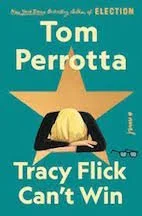REVIEW: 25 Years after 'Election,' Tracy Flick is Mellower -- but Still Intent on Winning
/Tracy Flick Can’t Win by Tom Perrotta
Scribner 272 pp.
By Charlie Gofen
Tom Perrotta has brought back everybody’s favorite overachiever in Tracy Flick Can’t Win, giving another high school an opportunity to heap abuse on her 25 years after she was cheated out of the student body presidency in the controversial vote count of his 1998 novel Election.
In the time between novels, Flick graduated from Georgetown and started at Georgetown Law, but left to care for her ailing mother and never returned to finish law school. Instead, she became a high school teacher, got a Ph.D. in education administration, and rose to her current role of assistant principal at Green Meadow High School. She has also raised her daughter, who is 10 years old at the start of the new book, largely on her own. This backstory makes the Flick of the newer book more sympathetic a figure than the Flick of Election (which most fans will remember from Reese Witherspoon’s iconic portrayal in the 1999 movie based on Perrotta’s book).
The main plot of the new novel mirrors that of the original, with Flick again competing for a top job, this time hoping to be selected as her school’s principal, but again facing a last-minute challenger brought in to steal the position that she so clearly deserves. And once again, the boorish behavior of the men around her, from the outgoing principal to the new school board president, reminds us of what an uphill battle Flick faces as she strives to be treated fairly. (As was the case with the lecherous teachers of Election, Perrotta’s take on how the principal in Tracy Flick Can’t Win thinks about schoolgirls will offend some readers, even though the author aims to criticize rather than celebrate this coarseness.)
In both novels, Flick’s lack of “likability” works against her, even though she is the most qualified candidate. “Everyone respected her, but no one loved her,” the school board president says of Flick in the newer book. Gender definitely plays a role in this assessment; it doesn’t help that she tells the school superintendent that football is a “stupid game.”
Flick sizes up her competition for the job of principal, noting that her main opponent “botched the schedule, made terrible hiring decisions, and was wildly inconsistent on disciplinary matters. His evaluations and reports were unreadable, completely useless.”
“But I also knew,” Flick continues, “that it didn’t matter. [He] was a local legend, a charming loudmouth, the man who brought home the trophies. And who was I? I was nobody. A woman. A lowly bureaucrat. … It didn’t matter that I was better than he was – smarter and more competent and harder working and more dedicated to the kids. I couldn’t win. They wouldn’t let me.”
Perrotta adds a subplot in which a special committee meets to choose the inaugural entrants for the school’s Hall of Fame. Should the school honor its greatest football player ever, even though he’s a thrice-divorced jerk who treated a lot of people badly when he was a student, or perhaps an alum who built his wealth running auto dealerships? Should it consider a young Internet star, or perhaps a student who was sent off to Vietnam shortly after high school graduation and never returned? As with the search for a new head of the school, look for backroom politics and last-minute entries to muck up the decision-making process.
Perrotta’s writing is crisp and witty, and the new novel is a quick, fun read. Still, it lacks the depth of his best work and has the feel of a film treatment, almost as if the author hopes that Witherspoon will return to play Flick once again.
I won’t give away the ending, but it’s a shocker. Safe to say that Perrotta is as prescient about the state of the nation today as he was in 1998 when he wrote about a corrupt individual’s attempt to sway an election by throwing out some valid ballots.
Charlie Gofen is an investment counselor in Chicago who has taught high school and been a newspaper reporter.










